All Types Of Crossbow Bolts: Pros & Cons
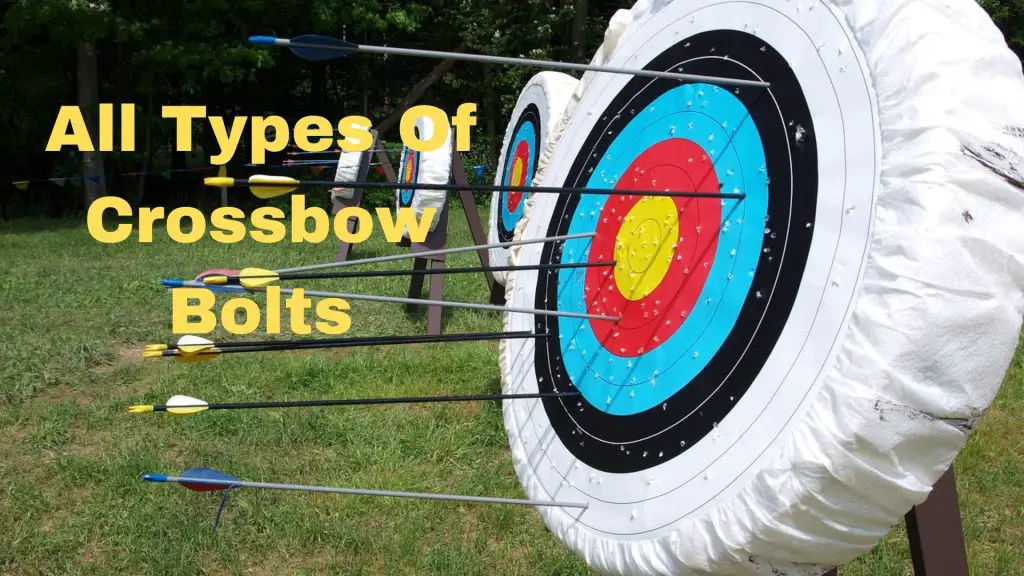
Crossbows are powerful and versatile weapons that have been used for hunting and warfare for centuries.
They have gained immense popularity among archery enthusiasts and hunters because of their accuracy and ease of use.
However, when it comes to choosing the right crossbow bolt, many people are often confused due to the various types of bolts available in the market.
Types Of Crossbow Bolts: An Overview
A crossbow bolt, also known as an arrow, is a projectile that is shot from a crossbow.
The right type of bolt can make a significant difference in the accuracy, power, and range of your crossbow.
Therefore, it is essential to understand the different types of bolts and their characteristics before selecting one for your crossbow.
In this article, we will discuss the various types of crossbow bolts available in the market, their pros and cons, and the recommended use of each type.
We will also provide an overview of the different components of crossbow bolts and offer recommendations for selecting the right components.
By the end of this article, you will have a better understanding of the different types of crossbow bolts and be able to choose the right one for your crossbow.
Let me now tell you the different types of bolts.
First, we see the types of bolts based on their composite materials.
Aluminum Bolts
Aluminum bolts are one of the most common types of bolts used in crossbows. They are made from aluminum shafts and are known for their durability and consistency.
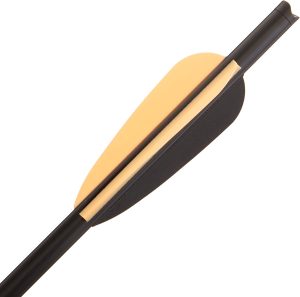
Here are some key characteristics of aluminum bolts:
Make: Aluminum bolts are made from high-strength aluminum alloy, which provides them with rigidity and strength.
They are lightweight and easy to handle, making them a popular choice among crossbow hunters and target shooters.
Pros and cons of aluminium bolts: One of the main advantages of aluminum bolts is their durability.
They can withstand repeated use and impact without bending or breaking. They are also affordable and readily available in most sporting goods stores.
However, aluminum bolts are not as accurate as other types of bolts, such as carbon or hybrid bolts.
They are also more susceptible to wind drift and have a shorter range than other types of bolts.
Recommended use of aluminum bolts: Aluminum bolts are ideal for beginners and those on a budget.
They are suitable for target practice and small game hunting but are not recommended for larger game hunting or long-range shooting.
If you are looking for a reliable and affordable bolt that can be used for practice or recreational shooting, aluminum bolts are an excellent choice.
Carbon Bolts
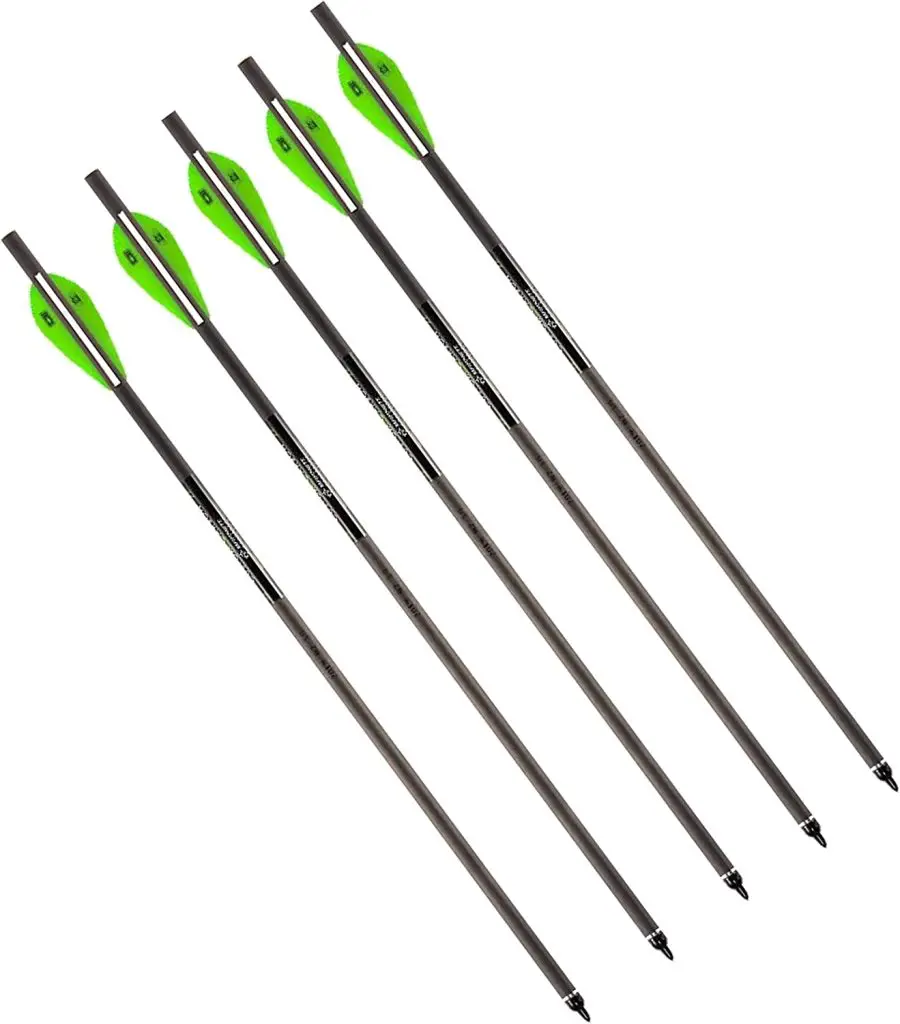
Carbon bolts are a popular type of bolt among crossbow hunters and target shooters.
They are made from carbon fiber, which provides them with superior strength and accuracy. Here are some key characteristics of carbon bolts:
Make of carbon bolts: Carbon bolts are made from carbon fiber, which is a strong and lightweight material.
They are designed to be stiff and straight, which makes them highly accurate and consistent.
Carbon bolts are available in different sizes and weights to accommodate different types of crossbows and shooting styles.
Pros and cons of carbon bolts: One of the main advantages of carbon bolts is their superior accuracy.
They are designed to fly straight and true, even over long distances. They are also lightweight and have a longer range than aluminum bolts.
However, carbon bolts are more expensive than aluminum bolts and can be more susceptible to damage from impact or improper use.
Recommended use of carbon bolts: Carbon bolts are ideal for hunters and target shooters who require high accuracy and long-range capabilities.
They are also suitable for those who want a bolt that can withstand repeated use and offer consistent performance.
If you are willing to invest in a high-quality bolt that will help you achieve superior accuracy and performance, carbon bolts are an excellent choice.
Check Aluminum Vs. Carbon Arrows
Hybrid Bolts
Hybrid bolts are a combination of aluminum and carbon materials, which provide them with a unique set of characteristics.
Here are some key characteristics of hybrid bolts:
Make of hybrid bolts: Hybrid bolts are made from a combination of aluminum and carbon materials.
They typically have an aluminum shaft with carbon inserts or tips, which provide them with increased durability and accuracy.
Hybrid bolts are designed to offer the best of both worlds, combining the durability of aluminum with the accuracy of carbon.
Pros and cons of hybrid bolts: One of the main advantages of hybrid bolts is their unique combination of durability and accuracy.
They are designed to be durable enough to withstand repeated use and impact, while also offering superior accuracy and consistency.
They are also relatively affordable, making them a good option for crossbow users on a budget.
However, hybrid bolts may not offer the same level of accuracy as pure carbon bolts, and they can be more expensive than pure aluminum bolts.
Recommended use of hybrid bolts: Hybrid bolts are a good option for crossbow users who want a reliable and accurate bolt that can withstand repeated use and impact.
They are suitable for hunting and target shooting, and they offer a good balance of durability and accuracy.
If you want a bolt that combines the best of both aluminum and carbon materials, hybrid bolts are an excellent choice.
Fiberglass Bolts
Fiberglass bolts are a traditional type of bolt that has been used in crossbows for many years.
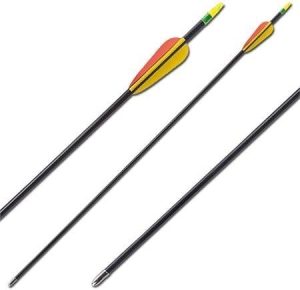
They are made from a fiberglass shaft and are known for their affordability and durability. Here are some key characteristics of fiberglass bolts:
Make of fiberglass bolts: Fiberglass bolts are made from a fiberglass shaft, which provides them with a high level of durability and strength. They are designed to be lightweight and easy to handle, making them a good option for beginners and those who are new to crossbow shooting.
Pros and cons of fiberglass bolts: One of the main advantages of fiberglass bolts is their affordability.
They are one of the most inexpensive types of bolts available, making them a good option for those on a budget.
They are also very durable and can withstand repeated use and impact.
However, fiberglass bolts are not as accurate as other types of bolts and have a shorter range. They are also more susceptible to wind drift than other types of bolts.
Recommended use of fiberglass bolts: Fiberglass bolts are a good option for beginners who are just starting out with crossbow shooting.
They are suitable for target practice and small game hunting but are not recommended for larger game hunting or long-range shooting.
If you are looking for an affordable and reliable bolt that can be used for practice or recreational shooting, fiberglass bolts are a good choice.
Wooden Bolts
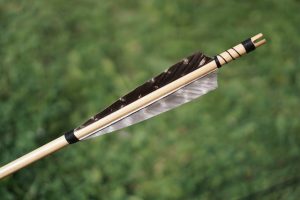
Wooden bolts are a traditional type of bolt that has been used in crossbows for many years.
They are made from a wooden shaft and are known for their classic look and feel.
Here are some key characteristics of wooden bolts:
Make of wooden bolts: Wooden bolts are made from a wooden shaft, which provides them with a classic look and feel.
They are designed to be lightweight and easy to handle, making them a good option for beginners and those who are new to crossbow shooting.
Wooden bolts can be easily crafted at home with basic woodworking tools, making them a popular choice for those who prefer to make their own bolts.
Pros and cons of wooden bolts: One of the main advantages of wooden bolts is their classic look and feel.
They provide a traditional and authentic experience for crossbow users. They are also very affordable and can be easily crafted at home with basic woodworking tools.
However, wooden bolts are not as durable or accurate as other types of bolts and can be more susceptible to damage from impact or improper use.
They are also not suitable for long-range shooting or hunting larger games.
Check: Wooden Vs Carbon Arrows: Which One Should You Choose?
Recommended use of wooden bolts: Wooden bolts are a good option for those who prefer a traditional and authentic experience when shooting a crossbow.
They are suitable for target practice and small game hunting but are not recommended for larger game hunting or long-range shooting.
If you are looking for a classic and affordable option for your crossbow, wooden bolts are a good choice.
Classification of Crossbow Bolts Based on Weight
Crossbow bolts can also be classified based on their weight.
The weight of a bolt affects its speed, trajectory, and penetration power, making it an important factor to consider when choosing the right bolt for your crossbow.
Here are the common weight classifications of crossbow bolts:
Lightweight bolts:
Lightweight bolts typically weigh between 300 and 350 grains.
These bolts are ideal for beginner or youth crossbow users as they are easier to handle and require less force to shoot. However, they may not offer the same level of accuracy or penetration power as heavier bolts.
Standard weight bolts:
Standard weight bolts usually weigh between 400 and 435 grains.
These bolts are a popular choice among intermediate to advanced crossbow users as they offer a good balance of speed, accuracy, and penetration power.
Heavyweight bolts:
Heavyweight bolts typically weigh between 450 and 500 grains or more.
These bolts are designed for hunting or long-range shooting and offer higher penetration power and stability in flight, but they may be slower and require more force to shoot.
Ultra-heavyweight bolts:
Ultra-heavyweight bolts can weigh over 500 grains and are designed for big game hunting or extreme long-range shooting. These bolts offer maximum penetration power and stability but are slower and require a powerful crossbow to shoot effectively.
Choosing the right weight of bolt for your crossbow depends on various factors such as the intended use, crossbow model, and personal preference. It is recommended to consult with a professional or experienced crossbow user to determine the appropriate weight classification for your specific needs.
Check: Crossbow Hunters’ Dilemma: 100 GR vs 125 GR Crossbow Broadheads
Crossbow Bolts Based on Tip
Crossbow bolts can also be classified based on the type of tip or point they have.
The tip of a bolt affects its ability to penetrate the target and may be designed for specific types of hunting or shooting.
Here are some common classifications of crossbow bolts based on their tip:
Field points:
Field points are the most common type of tip for crossbow bolts.
They are typically made of steel or other metal and are designed to be aerodynamic and accurate. Field points are ideal for target shooting and practice as they do not cause significant damage to the target.
Broadheads:
Broadheads are designed for hunting and have a wider, more substantial tip than field points.
They are designed to cause maximum damage to the target, making them ideal for hunting big game animals.
Broadheads can be further classified into two types: fixed-blade and mechanical.
Fixed-blade broadheads have blades that are permanently fixed in place, while mechanical broadheads have blades that deploy upon impact.
Check: Can I Use Crossbow Broadheads For My Compound Bow?
Blunt tips:
Blunt tips are designed for small game hunting or target shooting where a broadhead may cause too much damage.
They have a flat or rounded tip that is less likely to penetrate the target deeply, making them ideal for shooting at small game animals or for target practice.
Armor-piercing tips:
Armor-piercing tips are designed for military or tactical applications and are designed to penetrate armor or other barriers.
They typically have a sharp, pointed tip made of a durable material such as steel.
Choosing the right tip for your crossbow bolt depends on the intended use, hunting regulations, and personal preference.
It is important to ensure that the tip you choose is compatible with your crossbow and that it meets any safety standards or regulations.
Bolt Components
Regardless of the material used to make them, crossbow bolts consist of several components that work together to make them effective. Here are some key components of crossbow bolts:
A. Shaft
The shaft is the long, cylindrical part of the bolt that is typically made from aluminum, carbon, fiberglass, wood, or a hybrid material.
The shaft’s diameter and length affect the bolt’s overall weight, speed, and accuracy.
B. Nock
The nock is a small plastic or aluminum piece that attaches to the end of the shaft and holds the bolt in place on the crossbow string.
The nock comes in different sizes and shapes to fit various crossbow models.
C. Fletching
The fletching is the small, feather-like piece that is attached to the back of the shaft. It helps stabilize the bolt in flight and improves its accuracy.
Fletching is typically made from plastic or real feathers and can come in different shapes and colors.
D. Point
The point is the sharp tip of the bolt that pierces the target. The point can be made from steel, aluminum, or other materials and can come in various shapes and sizes depending on the intended use of the bolt.
E. Inserts
Inserts are small pieces that fit inside the end of the bolt and can be made from aluminum or brass. They help provide additional weight and support to the bolt and can also help improve accuracy.
F. Vanes
Similar to fletching, vanes are small, plastic pieces that are attached to the back of the bolt to help stabilize it in flight.
They are typically used in place of real feathers and can come in different shapes and colors.
G. Wraps
Wraps are thin, vinyl or paper stickers that are applied to the shaft of the bolt.
They can come in different designs and colors and serve both decorative and functional purposes. Wraps can help protect the shaft from damage and make it easier to see the bolt in flight.
Conclusion
Crossbow bolts come in various types, each with its own advantages and disadvantages.
Aluminum bolts are lightweight, durable, and affordable, while carbon bolts offer higher speed and accuracy.
Hybrid bolts combine the benefits of both aluminum and carbon materials.
Fiberglass bolts are inexpensive and durable, making them ideal for beginners or target practice. Wooden bolts are a traditional and affordable option for those who prefer a classic look and feel.
Regardless of the material used, crossbow bolts consist of several key components, including the shaft, nock, fletching, point, inserts, vanes, and wraps.
Understanding these components can help you select the right materials and configuration for your specific needs and intended use.
When choosing a bolt, it is important to consider your experience level, intended use, and budget.
Always make sure that the bolt you choose is compatible with your crossbow model and that it meets any safety standards or regulations.
With the right bolt and proper technique, you can enjoy the thrilling and rewarding experience of crossbow shooting.

